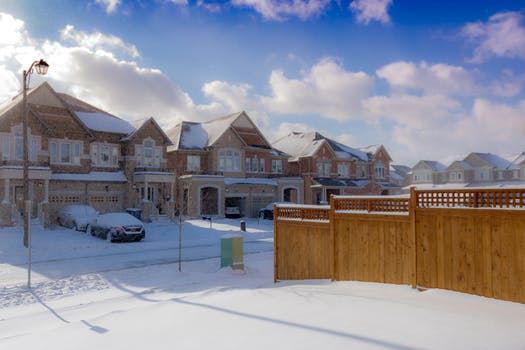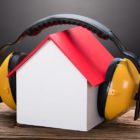It is important as the colder weather approached that you have started preparing your property for winter and the wet, cold and unsettled weather to come. With the winter months approaching, we all start to feel the bite of the cold and the discomfort of the wet and icy. It is therefore best to prepare your property for the coming season and unpredictable weather as soon as you can and once the summer is starting to drift away.
A dramatic change in temperature can cause your property to react in a range of potentially damaging, even negative and detrimental ways, many of which have the potential to cause lasting damage which may otherwise stretch beyond the winter. Hence, being prepared in the first place, is key to avoiding any such problems occurring.
Issues that commonly arise in the winter months for all nature of properties include burst and frozen pipes, boiler breakdowns, leaky roofs, roof tiles becoming damaged and dislodged and various other issues. Preparing your property for this winter may also mean that you are far better prepared for the next few winters and for the coming years.

Burst Pipes and Frozen Pipes
Pipes in many properties; houses, flats, maisonettes and otherwise tend to burst when too much water pressure builds up within a section of the pipe, which has become frozen due to the temperature outside. Furthermore, older properties which may have copper and metal pipes supplying them, as opposed to plastic or other more durable materials, could be at increased risk of freezing and therefore burst pipes.
This can easily result in the flooding of your property, which may then lead to costly insurance claims (more information about property and buildings insurance). If you are a landlord, this require your tenants to move out as well as a loss of rent payments and income.

Preventing Burst Pipes
Thankfully, burst pipes due to weather can be prevented with some practical steps which help to reduce the risks.
- Place the pipes in heated or warmer areas and away from attics and exterior walls. This will minimise the chances of frost setting in and affecting the pipes. If this is not possible, find a plumber to fit any vulnerable pipes with wrapping or insulation sleeves
- Walk around your property and make a note of any cracks and/or holes in outside walls or windows. Through cracks and holes, cold air can find its way to the pipe, causing them to burst. To prevent this, make sure that any gaps are sealed before the winter weather arrives. If you have double glazing in your property, this may be less likely
- When you are away from the property or, if as landlord, when your tenants go away or the property is vacant, make sure the heating is kept on a low temperature (above 4°C). This will help to maintain a consistent temperature around the pipes whilst you or your tenants are elsewhere and will help ensure the pipes never remain too cold or frozen
Property Maintenance for Winter
Guttering, damp and condensation are all causes for concern for property owners, landlords and tenants when it comes to the winter months. For guttering, you may find that that as the autumn leaves fall, the gutters, down-pipes and drainpipes become obstructed or even totally blocked. This will result in a build-up of water, which may then filter onto the roof, subsequently finding a way into the property itself.
To minimise your chances of having to deal with the effects of water damage, keep on top your gutters to make sure they are clear through autumn and winter; consider checking and clearing out guttering every few weeks to prevent a build up of leaves and obstructive debris.
When it comes to damp and condensation, there are various measures you can take to reduce the risks of condensation and ‘rising damp’ building up in your property. Build ups of damp and condensation can lead to outbreaks of mould. Should mould build up (usually on walls and ceilings which have been exposed to condensation and damp), this can lead to severe damage as well as potential health hazards.
When cooking, try to keep the kitchen door shut and windows open to prevent steam making its way into cooler rooms. You should also make sure that your bathrooms have good ventilation as the steam from the bath and the shower can cause damp if you do not have sufficient ventilation.
In both the kitchen and bathroom, it is important to have efficient ventilation systems in place to remove moisture and steam from the air, helping to reduce build ups of damp. If your property is a new build, it should have undergone ventilation testing and commissioning to test and validate its ventilation systems.
Getting Your Heating Ready for Winter
When the air gets colder outside, you will likely start using the heating much more than you had been over the warmer months. Before it gets to the stage in the year where you are going to start relying on the heating a lot more, you should check your heating appliances to ensure they are all working in order.
Your boiler and other heated devices are going to be very important through the winter months. Make sure that everyday appliances such as boilers, cookers and gas fires have been checked and tested for safety. If you are a tenant, your landlord will have a number of legal obligations, including carrying out a yearly Gas Safety inspection of the property which should test these appliances regularly to ensure they are totally safe (read more about Carbon monoxide poisoning).
It is generally only when there is a problem with an appliance that people notice any issues. However, you cannot afford to go days or weeks without these appliances and heated amenities in your home over the winter.
Carry Out Safety Checks
You should therefore aim to get your boiler and any other gas-powered or aided appliances checked and signed off by a Gas Safety registered engineer at least once a year, whether you are a tenant or property owner. This will not only save you money in the long run, but can also work to keep you and your fellow residents or family members safe, by reducing the risks of any carbon monoxide leaking into your home.
You should also check how well your radiators are working. Leaving this until you actually need your central heating can be very risky. With radiators, it is likely that they are going to be colder at the top than at the bottom, after many months of not being used. This is due to air being trapped inside the radiators, having not been flushed out.
Property Insulation
Around a quarter of the heat in your home is lost through the roof, so if you have good loft and cavity wall insulation, you will be better able to keep your home warmer for less money and with less energy used.
These improvements do not have to cost you a huge amount and can actually save you a lot of money over a long period of time. In the UK, there are a number of government grants and schemes which subsidise the cost of insulation installation.
The post Preparing Your Property for Winter appeared first on RJ Acoustics.




